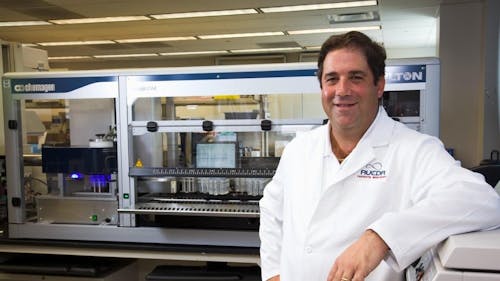Rutgers-developed coronavirus test gets FDA approval, will be used at Middlesex County testing site

Middlesex County, in partnership with Rutgers University Cell and DNA Repository (RUCDR) Infinite Biologics, RWJBarnabas Health and Accurate Diagnostic Labs (ADL), will be the first in New Jersey to introduce a saliva-based coronavirus disease (COVID-19) test, beginning Wednesday, according to a press release.
The Daily Targum previously reported RUCDR submitted an emergency use authorization request on April 1 for the saliva test. The Food and Drug Administration recently approved this request, allowing the test to be used on a mass scale, according to the release.
The new test, which will be offered at the drive-through testing site at the Kilmer Vehicle Inspection Center in Edison, will increase the number of tests conducted each day and provide results in 24 to 48 hours, according to the release. The Targum previously reported results from tests using nasal or throat swabs take three days.
Additionally, the saliva specimen can be collected without a medical provider, the Targum reported. Andrew Brooks, chief operating officer and director of technology development at RUCDR and professor in the Department of Genetics, said self-collection will help healthcare providers stay safe, according to an article on Rutgers Today.
“It means we no longer have to put health care professionals at risk for infection by performing nasopharyngeal or oropharyngeal collections,” he said, according to the article. “We can preserve precious personal protective equipment for use in patient care instead of testing.”
Brooks also said the saliva test will help increase testing at a time when current testing supplies are low, according to the press release. Additionally, collecting more specimens can help scientists develop vaccines or treatments for COVID-19, he said.
“For this reason, our partnership with Middlesex County is pivotal for our ongoing research as mass testing via a drive-through setting will generate the samples that will provide more accurate and timely information in curtailing the spread of COVID-19,” Brooks said, according to the release.
The Targum previously reported this test is based on a lab technique that can make millions of copies of the severe acute respiratory syndrome coronavirus 2 (SARS-CoV-2) nucleic acid.
Middlesex County Freeholder Director Ronald G. Rios said the contributions from RUCDR will significantly benefit the greater community during the COVID-19 crisis, according to the release.
“We have a rare advantage in such a critical time to be able to rapidly deploy increased testing capabilities and accelerated results while protecting our frontline workers,” he said, according to the release.



